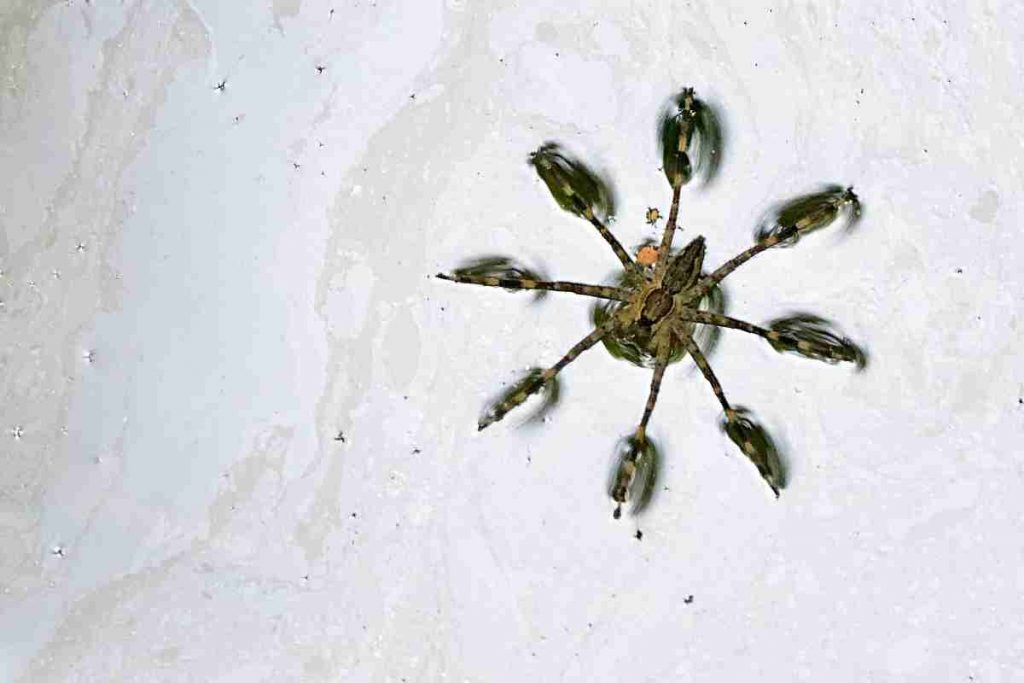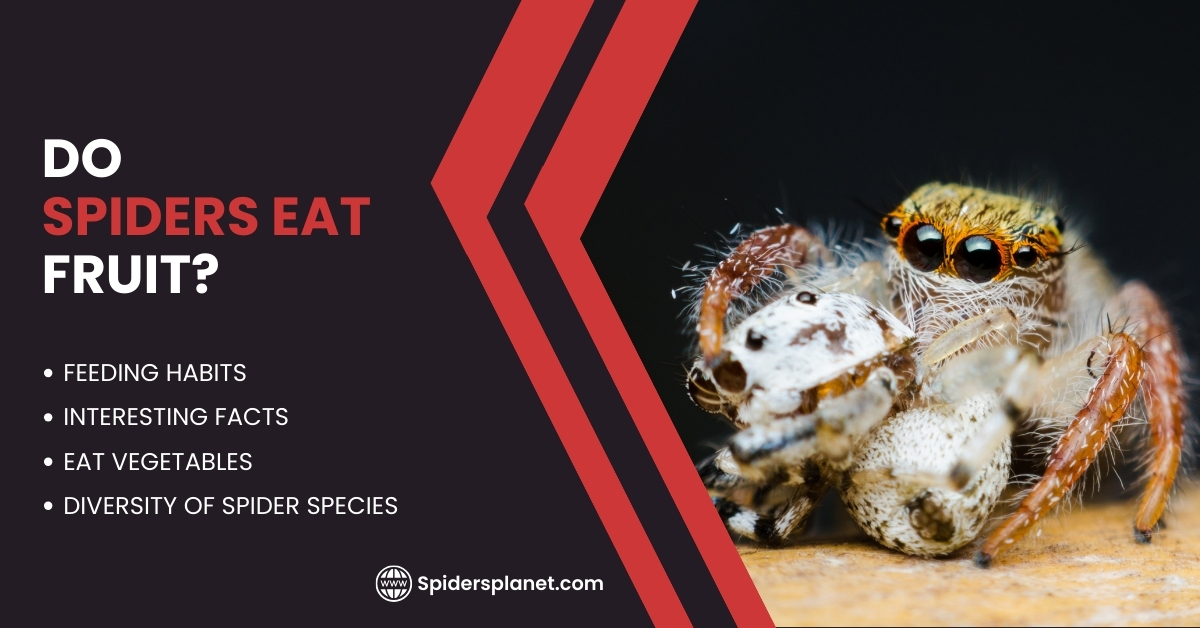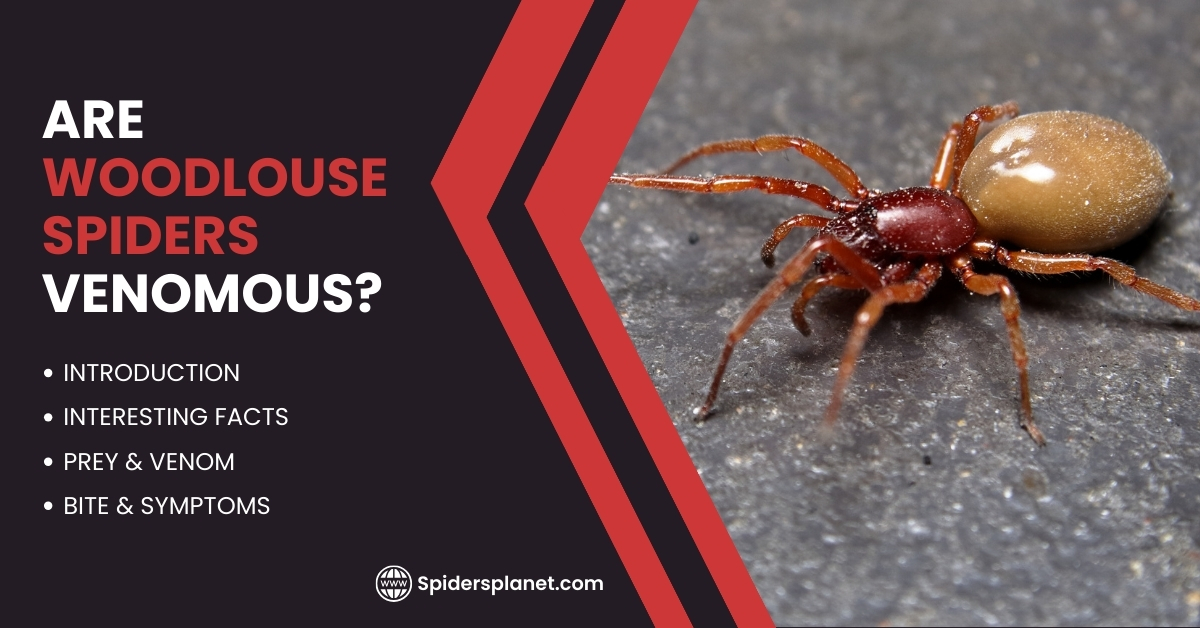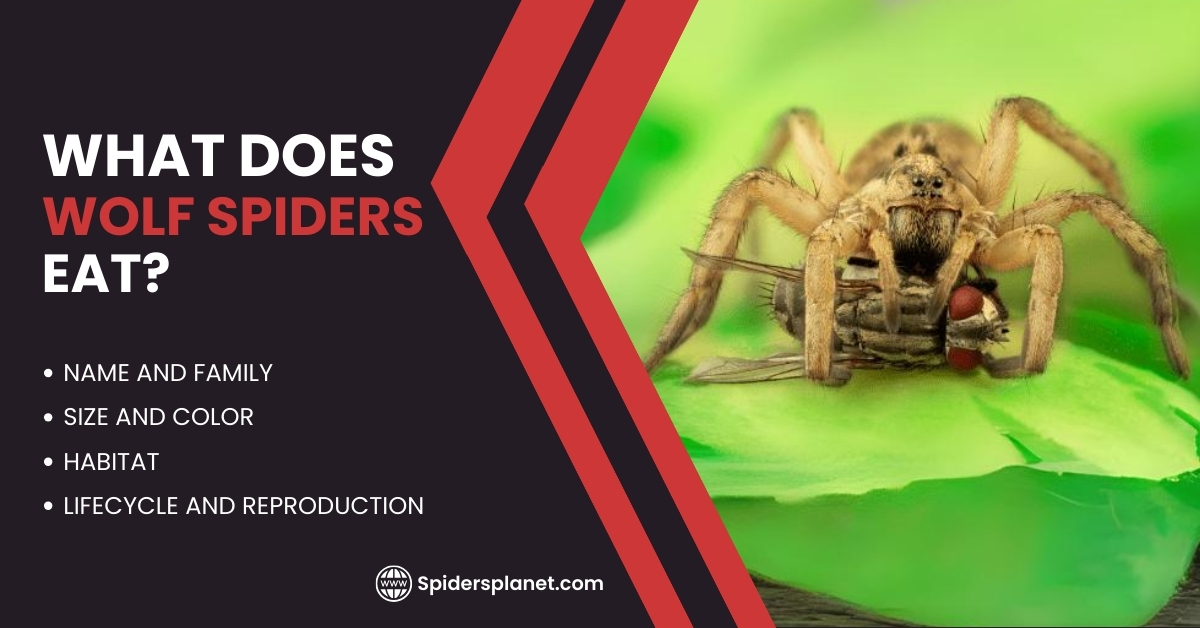Fishing spiders (Dolomedes) get their name from their unique hunting style, which involves waiting near water for fish or other small aquatic creatures to swim by.
When an unsuspecting victim “fish” comes within range, the spider will quickly snatch it up within seconds leaving it very little chance of getting away. However, apart from fish what else do fishing spiders eat?
Well, In this blog post, we will explore the different types of food that these spiders eat. We will also take a look at their hunting habits and how they catch their prey.
So, What Do Fishing Spiders Eat?
Most spiders are content to feast on the occasional fly or moth that wanders into their web. But not Fishing Spiders! This type of spider is very similar to the wolf spider and will actively stalk and hunt down its prey.
They will hunt both on land and in water and are known to be able to catch prey that is much larger than themselves. In addition, to fish these spiders have also been known to eat the following:
- Beetles
- Reptiles
- Crickets
- Amphibians
- Small Birds
- Grasshoppers
- Small Mammals

In fact, studies have shown that the majority of their diet (up to 80%) actually consists of insects. However, when there are no insects available these spiders will go searching for other food sources such as fish or amphibians.
Related Article:
What Do Baby Fishing Spiders Eat?
Just like their adult counterparts, baby fishing spiders will eat a variety of different prey. This includes insects, small fish, and other small animals.
However, when they first hatch, baby fishing spiders will only eat very small prey such as:
- Small Mites
- Mosquito Larvae
This is because they do not process the stretch to take down prey larger prey. But, more importantly, their fangs are not yet fully developed, which makes it difficult for them to stun and kill their prey.
As they grow older and larger, they will start to hunt for bigger prey items such as beetles, flies, and even fish.
Do Fishing Spiders Eat Their Own Kind?
While the idea of spiders eating other spiders may seem gruesome, it is actually a fairly common occurrence in the natural world. In most cases, spiders will only eat other spiders if they are hungry and there is no other food available.
However, there are some species of spiders that will actively hunt and kill other spiders for food.
In most cases, this behavior is due to competition for resources, but it can also simply be the result of an innate predatory instinct not for consumption!
While most people would prefer not to think about it, the fact is that spiders eating other spiders is a perfectly natural occurrence.
How Do They Catch Their Prey?
When fishing spiders hunt have a unique method of capturing their prey. They will usually do this in one of three ways. The majority of the time, fishing spiders will wait for their prey to come to them and this is when they stalk their prey.
Stalking
Fishing spiders are masters of stealth and will lie in wait for their prey, lurking in the shadows ready to strike. They are able to stalk their prey with silent precision.
When they strike, they do so with lightning speed, inject their venomous fangs into their victim, and then drag them back to their lair to be devoured.
On Water
Fishing spiders are an unusual species of spider and are able to walk on the surface of the water, and use their hind legs to anchor to plant, then with their front legs, they reach out and grab unsuspecting prey.
Fishing spiders also have specialized hairs on their body that help them to trap air and keep them buoyant. This allows them to reach beneath the water’s surface in pursuit of prey.
Web Funneling
Another way fishing spiders catch their prey is by web tunneling. The spider builds a funnel-shaped web out of silk. The web is then anchored to the ground at the edges, with the center-left open.
When an unsuspecting insect wanders into the web, the spider senses the vibrations and rushes out to subdue its prey. The spider will then securely wrap the prey in silk, but not before the spider injects the prey with its venom immobilizing it, ready to be devoured.
Thanks to these adaptations, fishing spiders are highly effective predators in their aquatic environment.
How Do Fishing Spiders Eat?
Most spiders including fishing spiders use their fangs to inject venom into their prey, paralyzing them. Once the prey is paralyzed, the spider then injects digestive enzymes into its body.
These enzymes break down the prey’s internal organs, liquefying them so that the spider can suck them up like a liquid.
Some spiders will also wrap their prey in silk before feeding, which helps to keep the meal from escaping and also provides added nutrients.
Related Article:
Where Do They Eat Their Prey?
These spiders will occasionally eat their prey on the spot, however, they will usually wrap them in silk and drag them back to their burrow. Once there, they will consume their meal at their leisure.
They may even save some of their prey for later if they are not hungry. This allows them to survive long periods without food if necessary.
What Foods Are Harmful To Fishing Spiders?
Just like any other animal, there are certain foods that can be harmful to fishing spiders. In most cases, these spiders will only eat food that is safe for them to consume.
However, there are some instances where a spider may accidentally eat something that is poisonous or otherwise harmful. In some cases, this can even lead to death.
It is important to note that just because a food item is harmful to one species of spider does not mean it will be harmful to all spiders. In fact, many spiders are able to safely eat food items that would be poisonous to other animals.
What Eats Fishing Spiders?
While fishing spiders are fearsome predators, they are not invincible. There are a number of animals that will prey on these spiders if given the chance. Some of the most common predators of fishing spiders include:
- Birds
- Frogs
- Big Fish
- Lizards
- Other spiders
These animals will typically eat fishing spiders for one of two reasons: either because they are looking for an easy meal or because they see the spider as a threat.
Either way, it is important to remember that even the most feared predators have their own predators. What goes around, comes around!
Conclusion
So, there you have it! Now you know what these spiders eat? What eats them? Fishing spiders are interesting creatures that have a lot of adaptations that help them to survive in their environment.
While they may not be the biggest or most feared predators, they are certainly one of the most fascinating!



